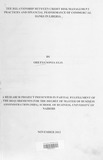| dc.description.abstract | Credit risk management has become an important topic for financial institutes, especially since the business sector of financial services is related to conditions of uncertainty. The turmoil of the financial industry emphasizes the importance of effective risk management procedures. Consequently, this research looks at “the relationship between Credit Risk management practice and the financial performance of Commercial banks in Liberia.” This research objective was formulated in order to gain a better understanding of credit risk management practices and its relationship with financial performance (return on asset).
Quantitative research design is employed under the quantitative research design survey method is used. The data were collected by cross sectional survey method.
The conclusion of this study shows a positive relationship between the credit risk management practices and financial performance. Commercial banks during the pre-liberalization period were not effective in managing their credit risk in contrast to the post-liberalization period. Variations in the credit policies by seven of the nine commercial banks reflect monetary and fiscal policy actions, where expansionary fiscal policy partly increased inflationary pressure and the monetary authority. During the post-liberalization period, most banks used the services of consultants to formulate their credit risk management policies which reduced the risk posed by defaulting on loans.
Commercial banks in Liberia should focus more attention on capacity building and special training of bank managers whose function relate to credit and loans to serve as a conduit of giving them sufficient knowledge on how to deal with credit issues and mitigate credit risk faced by these banks.
The legal system of Liberia should be reformed to enhance the enforcement of financial contracts. This would work as an incentive for banks to invest in information capital, thus reducing the information asymmetry problem. Consequently, the proportion of nonperforming loans will be reduced hence lower risk premium attributed to credit risk. In addition, efforts should be made to revitalize the growth of the economy and to attain macro stability in order to
increase the return on investment and reduce uncertainty.Credit risk management has become an important topic for financial institutes, especially since the business sector of financial services is related to conditions of uncertainty. The turmoil of the financial industry emphasizes the importance of effective risk management procedures. Consequently, this research looks at “the relationship between Credit Risk management practice and the financial performance of Commercial banks in Liberia.” This research objective was formulated in order to gain a better understanding of credit risk management practices and its relationship with financial performance (return on asset).
Quantitative research design is employed under the quantitative research design survey method is used. The data were collected by cross sectional survey method.
The conclusion of this study shows a positive relationship between the credit risk management practices and financial performance. Commercial banks during the pre-liberalization period were not effective in managing their credit risk in contrast to the post-liberalization period. Variations in the credit policies by seven of the nine commercial banks reflect monetary and fiscal policy actions, where expansionary fiscal policy partly increased inflationary pressure and the monetary authority. During the post-liberalization period, most banks used the services of consultants to formulate their credit risk management policies which reduced the risk posed by defaulting on loans.
Commercial banks in Liberia should focus more attention on capacity building and special training of bank managers whose function relate to credit and loans to serve as a conduit of giving them sufficient knowledge on how to deal with credit issues and mitigate credit risk faced by these banks.
The legal system of Liberia should be reformed to enhance the enforcement of financial contracts. This would work as an incentive for banks to invest in information capital, thus reducing the information asymmetry problem. Consequently, the proportion of nonperforming loans will be reduced hence lower risk premium attributed to credit risk. In addition, efforts should be made to revitalize the growth of the economy and to attain macro stability in order to
increase the return on investment and reduce uncertainty. | en |

